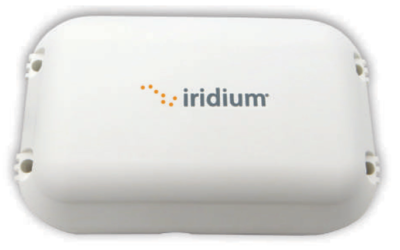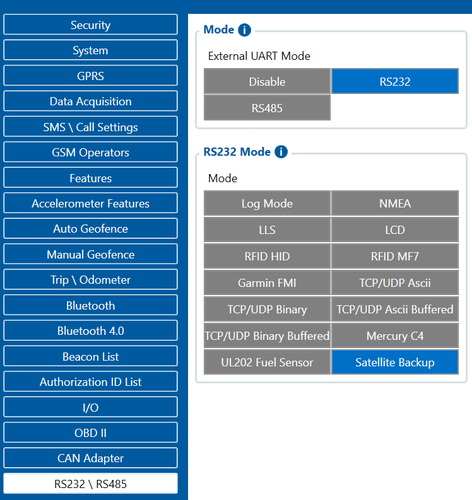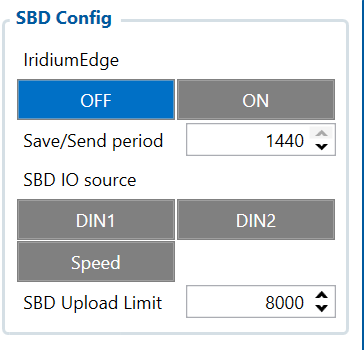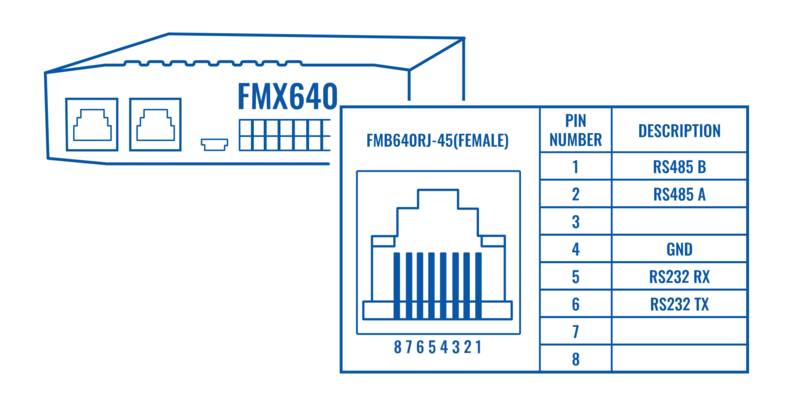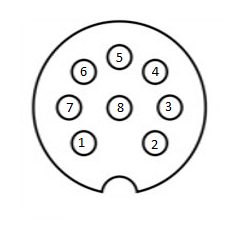Difference between revisions of "Iridium Edge"
| (43 intermediate revisions by 2 users not shown) | |||
| Line 1: | Line 1: | ||
[[File:Irr edge.png|alt=|right|400x400px]] | [[File:Irr edge.png|alt=|right|400x400px]] | ||
| − | + | __TOC__ | |
| − | + | Iridium Edge features an all-in-one SBD module and antenna, with power supply. The plug-and-play satellite IoT terminal can be easily paired with FMB devices in order to expand their functionality to no GSM coverage zones. Current Iridium implementation offers ability to generate and send SBD records after set period after the GSM signal is lost. This ensures constant connectivity for the clients as Iridium network is available globally. | |
| − | |||
| − | |||
| − | |||
| − | |||
| − | == | + | ==First Start== |
| − | |||
| − | [[File: | + | ===Installation=== |
| − | [[ | + | |
| − | < | + | '''[[Media:IRDM Iridium Edge Quick Installation Guide.pdf | Iridium Edge Quick Installation Guide]] document''' will show how to install Iridium Edge into the vehicle and prepare the device for configuration with our FMX640 and FMX125 family devices. |
| + | |||
| + | '''Please note: it is essential to follow all the instructions for effective installation, if any further questions arise, please contact your sales representative for more information.''' | ||
| + | |||
| + | ===Key Features=== | ||
| + | * Hardware-Ready Device for Simple, Low Risk Integration | ||
| + | * Satellite Add-On for Truly Global Coverage | ||
| + | * Robust Power Supply for Industrial Installations | ||
| + | * Certified in Key Geographic Markets | ||
| + | * 180° Line of Sight for Compromised, Partially Blocked Locations | ||
| + | |||
| + | ===Network characteristics=== | ||
| + | * Frequency: 1616 – 1626.5 MHz | ||
| + | * Message Size: 14 Bytes (Receive), 14 Bytes (Transmit) | ||
| + | * SBD Transceiver: Iridium 9602N | ||
| + | * Antenna: Integrated Iridium® Certified Antenna | ||
| + | |||
| + | ===Environmental characteristics=== | ||
| + | * Operating/Storage Temperature Range: -40C to 85C | ||
| + | * Vibration: SAE J1455, Section 4.10 | ||
| + | |||
| + | ===Mechanical characteristics=== | ||
| + | * Dimensions (LxWxH): 130 x 80 x 30mm | ||
| + | * Ingress Protection: IP 67 | ||
| + | * Side & Bottom Cable Exits | ||
| + | * Connector: M12-8 pin male, terminated on 20cm | ||
| + | * Pigtail Cable | ||
| + | * Installation Options: Pole, Screw, Tape | ||
| + | |||
| + | ===Electrical characteristics=== | ||
| + | * Power Supply: ( 9-32V), SAE J1455 Load Dump Protected | ||
| + | * Maximum Power: 1.6W (Peak for Short Transmit Burst) | ||
| + | * Low Power Modes: < 200uA | ||
| + | * Reverse Polarity Protection | ||
| + | |||
| + | ===Interface characteristics=== | ||
| + | * RS232 AT Command Interface | ||
| + | * On / Off Control Lines | ||
| + | |||
| + | ==Configuration== | ||
| + | |||
| + | ===FMB Firmware implementation on FMX125/FMX225=== | ||
| + | |||
| + | In order to enable Iridium support on FMB, first it is necessary to enable RS232 support and select “satellite backup” mode. Correct configuration is shown in the picture below. | ||
| + | |||
| + | [[File:Iridium rs232 parameter config.png|center|500x500 px]] | ||
| + | |||
| + | Next, there are a couple of configurable options. In the SBD config, IridiumEdge should be enabled and save/send period Set. This section can be found in the “Features” tab in the configurator. | ||
| + | |||
| + | [[File:Sbd config configurator.png|center]] | ||
| + | |||
| + | '''NOTE:In addition, you can select which IO element can generate Alarm priority record. The configurable IO parameters are listed as SBD IO source in list above. In order to do that you need to configure these IO elements as Panic priority. If properly configured SBD records are generated and sent if there is no GSM connection.''' | ||
| + | <br></br> | ||
| + | [[File:FMB640 iridium1.png]] | ||
| + | <br></br> | ||
| + | In the scenario shown in the above picture when panic record is made (generated by ''Digital Input 1'' or ''Digital Input 2'') internal 90 seconds timer will start to tick and if in that timeout device will not send the record through GPRS network it will be sent with Iridium satellites. | ||
| + | |||
| + | SBD Upload Limit is configurable and resets every month. This option can ensure that no additional data is used so that no unexpected costs are experienced by the customer. Default value is 8000 (for 8KB plan). This option can be disabled by setting Upload limit to 0. | ||
| + | |||
| + | '''NOTE:''' SBD IO source functionality is still being implemented. | ||
| + | |||
| + | ===FMB Firmware configuration on FMX640/FMX641 devices=== | ||
| + | |||
| + | FMX640 can be setup with Iridium Edge by activating RS232 short burst data parameters, this can be done visiting this tutorial [https://wiki.teltonika-gps.com/view/FMB641_Short_Burst_Data Here]. | ||
| + | |||
| + | [[File:FMX640 and RS232 illustration v1.2.png|900x400px]] | ||
| + | |||
| + | [[File:Iridium Edge pinout.png|300px|left]] | ||
| + | {| class="wikitable" style="width:70%;" | ||
| + | |+ | ||
| + | ! colspan="5" style="width:20%; border: 1px solid white; border-bottom: 2px solid #0054A6; background: white; color: #0054A6; text-align: left;"| PIN OUT Configuration | ||
| + | |- | ||
| + | ! style="width:10%; border: 1px solid white; border-bottom: 2px solid #0054A6; background: white; color: #0054A6; text-align: left;"| Pin Number | ||
| + | ! style="width:10%; border: 1px solid white; border-bottom: 2px solid #0054A6; background: white; color: #0054A6; text-align: left;"| Signal Name | ||
| + | ! style="width:10%; border: 1px solid white; border-bottom: 2px solid #0054A6; background: white; color: #0054A6; text-align: left;"| Color | ||
| + | ! style="width:10%; border: 1px solid white; border-bottom: 2px solid #0054A6; background: white; color: #0054A6; text-align: left;"| Signal Direction (With respect to iridium edge) | ||
| + | ! style="width:10%; border: 1px solid white; border-bottom: 2px solid #0054A6; background: white; color: #0054A6; text-align: left;"| Description | ||
| + | |- | ||
| + | | style="border: 1px solid white; border-bottom: 2px solid #E8E8E8; text-align: left; vertical-align: center; background: white;" | 1 | ||
| + | | style="border: 1px solid white; border-bottom: 2px solid #E8E8E8; text-align: left; vertical-align: center; background: white;" | Spare | ||
| + | | style="border: 1px solid white; border-bottom: 2px solid #E8E8E8; text-align: left; vertical-align: center; background: white;" | White | ||
| + | | style="border: 1px solid white; border-bottom: 2px solid #E8E8E8; text-align: left; vertical-align: center; background: white;" | - | ||
| + | | style="border: 1px solid white; border-bottom: 2px solid #E8E8E8; text-align: left; vertical-align: center; background: white;" | Unused | ||
| + | |- | ||
| + | | style="border: 1px solid white; border-bottom: 2px solid #E8E8E8; text-align: left; vertical-align: center; background: white;" | 2 | ||
| + | | style="border: 1px solid white; border-bottom: 2px solid #E8E8E8; text-align: left; vertical-align: center; background: white;" | Ground | ||
| + | | style="border: 1px solid white; border-bottom: 2px solid #E8E8E8; text-align: left; vertical-align: center; background: white;" | Brown | ||
| + | | style="border: 1px solid white; border-bottom: 2px solid #E8E8E8; text-align: left; vertical-align: center; background: white;" | Input | ||
| + | | style="border: 1px solid white; border-bottom: 2px solid #E8E8E8; text-align: left; vertical-align: center; background: white;" | Signal and power GND | ||
| + | |- | ||
| + | | style="border: 1px solid white; border-bottom: 2px solid #E8E8E8; text-align: left; vertical-align: center; background: white;" | 3 | ||
| + | | style="border: 1px solid white; border-bottom: 2px solid #E8E8E8; text-align: left; vertical-align: center; background: white;" | RS232_RX | ||
| + | | style="border: 1px solid white; border-bottom: 2px solid #E8E8E8; text-align: left; vertical-align: center; background: white;" | Green | ||
| + | | style="border: 1px solid white; border-bottom: 2px solid #E8E8E8; text-align: left; vertical-align: center; background: white;" | Input | ||
| + | | style="border: 1px solid white; border-bottom: 2px solid #E8E8E8; text-align: left; vertical-align: center; background: white;" | RS232 input | ||
| + | |- | ||
| + | | style="border: 1px solid white; border-bottom: 2px solid #E8E8E8; text-align: left; vertical-align: center; background: white;" | 4 | ||
| + | | style="border: 1px solid white; border-bottom: 2px solid #E8E8E8; text-align: left; vertical-align: center; background: white;" | RS232_TX | ||
| + | | style="border: 1px solid white; border-bottom: 2px solid #E8E8E8; text-align: left; vertical-align: center; background: white;" | Yellow | ||
| + | | style="border: 1px solid white; border-bottom: 2px solid #E8E8E8; text-align: left; vertical-align: center; background: white;" | Output | ||
| + | | style="border: 1px solid white; border-bottom: 2px solid #E8E8E8; text-align: left; vertical-align: center; background: white;" | RS232 output | ||
| + | |- | ||
| + | | style="border: 1px solid white; border-bottom: 2px solid #E8E8E8; text-align: left; vertical-align: center; background: white;" | 5 | ||
| + | | style="border: 1px solid white; border-bottom: 2px solid #E8E8E8; text-align: left; vertical-align: center; background: white;" | Power | ||
| + | | style="border: 1px solid white; border-bottom: 2px solid #E8E8E8; text-align: left; vertical-align: center; background: white;" | Pink | ||
| + | | style="border: 1px solid white; border-bottom: 2px solid #E8E8E8; text-align: left; vertical-align: center; background: white;" | Input | ||
| + | | style="border: 1px solid white; border-bottom: 2px solid #E8E8E8; text-align: left; vertical-align: center; background: white;" | 9-32 V positive terminal | ||
| + | |- | ||
| + | | style="border: 1px solid white; border-bottom: 2px solid #E8E8E8; text-align: left; vertical-align: center; background: white;" | 6 | ||
| + | | style="border: 1px solid white; border-bottom: 2px solid #E8E8E8; text-align: left; vertical-align: center; background: white;" | ON/OFF | ||
| + | | style="border: 1px solid white; border-bottom: 2px solid #E8E8E8; text-align: left; vertical-align: center; background: white;" | Grey | ||
| + | | style="border: 1px solid white; border-bottom: 2px solid #E8E8E8; text-align: left; vertical-align: center; background: white;" | Input | ||
| + | | style="border: 1px solid white; border-bottom: 2px solid #E8E8E8; text-align: left; vertical-align: center; background: white;" | Optional line to power down Iridium edge | ||
| + | |- | ||
| + | | style="border: 1px solid white; border-bottom: 2px solid #E8E8E8; text-align: left; vertical-align: center; background: white;" | 7 | ||
| + | | style="border: 1px solid white; border-bottom: 2px solid #E8E8E8; text-align: left; vertical-align: center; background: white;" | Network available | ||
| + | | style="border: 1px solid white; border-bottom: 2px solid #E8E8E8; text-align: left; vertical-align: center; background: white;" | Blue | ||
| + | | style="border: 1px solid white; border-bottom: 2px solid #E8E8E8; text-align: left; vertical-align: center; background: white;" | Output | ||
| + | | style="border: 1px solid white; border-bottom: 2px solid #E8E8E8; text-align: left; vertical-align: center; background: white;" | - | ||
| + | |- | ||
| + | | style="border: 1px solid white; border-bottom: 2px solid #E8E8E8; text-align: left; vertical-align: center; background: white;" | 8 | ||
| + | | style="border: 1px solid white; border-bottom: 2px solid #E8E8E8; text-align: left; vertical-align: center; background: white;" | Power detection | ||
| + | | style="border: 1px solid white; border-bottom: 2px solid #E8E8E8; text-align: left; vertical-align: center; background: white;" | Red | ||
| + | | style="border: 1px solid white; border-bottom: 2px solid #E8E8E8; text-align: left; vertical-align: center; background: white;" | Output | ||
| + | | style="border: 1px solid white; border-bottom: 2px solid #E8E8E8; text-align: left; vertical-align: center; background: white;" | Active high when Iridium Edge is powered | ||
| + | |} | ||
| + | |||
| + | '''Important note''' There is a noticeable difference in Iridium 8-pin cable layout from the standard version of the cable. There are possible two options that could be taken. | ||
| + | * Purchasing a specific Iridium 8-PIN cable directly from Teltonika. Please contact your administered sales representative in order to purchase. | ||
| + | * Restructuring the cable yourself by cutting one end of the cable and aligning the cable PINs with the reference to the picture above. | ||
| + | |||
| + | ==Communication Protocol== | ||
| + | {| class="wikitable" style="width:50%;" | ||
| + | |+ | ||
| + | ! colspan="7" style="width:50%; border: 1px solid white; border-bottom: 2px solid #0054A6; background: white; color: #0054A6; text-align: left;"| SBD Packet structure | ||
| + | |- | ||
| + | ! style="width:10%; border: 1px solid white; border-bottom: 2px solid #0054A6; background: white; color: #0054A6; text-align: left;"| Timestamp | ||
| + | ! style="width:10%; border: 1px solid white; border-bottom: 2px solid #0054A6; background: white; color: #0054A6; text-align: left;"| Longitude | ||
| + | ! style="width:10%; border: 1px solid white; border-bottom: 2px solid #0054A6; background: white; color: #0054A6; text-align: left;"| Latitude | ||
| + | ! style="width:15%; border: 1px solid white; border-bottom: 2px solid #0054A6; background: white; color: #0054A6; text-align: left;"| SBD AVL ID and flags | ||
| + | ! style="width:10%; border: 1px solid white; border-bottom: 2px solid #0054A6; background: white; color: #0054A6; text-align: left;"| DIN/DOUT info | ||
| + | ! style="width:10%; border: 1px solid white; border-bottom: 2px solid #0054A6; background: white; color: #0054A6; text-align: left;"| Reserved | ||
| + | ! style="width:10%; border: 1px solid white; border-bottom: 2px solid #0054A6; background: white; color: #0054A6; text-align: left;"| Speed | ||
| + | |- | ||
| + | | style="border: 1px solid white; border-bottom: 2px solid #E8E8E8; text-align: left; vertical-align: center; background: white;" | 4 bytes | ||
| + | | style="border: 1px solid white; border-bottom: 2px solid #E8E8E8; text-align: left; vertical-align: center; background: white;" | 3 bytes | ||
| + | | style="border: 1px solid white; border-bottom: 2px solid #E8E8E8; text-align: left; vertical-align: center; background: white;" | 3 bytes | ||
| + | | style="border: 1px solid white; border-bottom: 2px solid #E8E8E8; text-align: left; vertical-align: center; background: white;" | 1 bytes | ||
| + | | style="border: 1px solid white; border-bottom: 2px solid #E8E8E8; text-align: left; vertical-align: center; background: white;" | 1 bytes | ||
| + | | style="border: 1px solid white; border-bottom: 2px solid #E8E8E8; text-align: left; vertical-align: center; background: white;" | 1 bytes | ||
| + | | style="border: 1px solid white; border-bottom: 2px solid #E8E8E8; text-align: left; vertical-align: center; background: white;" | 1 bytes | ||
| + | |} | ||
| + | |||
| + | '''Definitions''' | ||
| + | |||
| + | * Timestamp – Indicates when record was generated | ||
| + | * Longitude - encoded in 3 bytes data. Server which gets this data should divide result from 46603,375 and subtract 180 in order to get actual longitude value. This coefficient is got in following way: 16777215(maximum 3 bytes value) divided from 360 (maximum longitude value then 180 is added). This calculation is used to fit negative and positive values to 3 bytes width variable. | ||
| + | * Latitude - Latitude is calculated in same way as longitude but since latitude maximum value is two times smaller than longitude it can produce a bit more accurate data. Coefficient for latitude is 93206,75. This coefficient is got in following way: 16777215(maximum 3 bytes value) divided from 180 (maximum latitude value then 90 is added). This calculation is used to fit negative and positive values to 3 bytes width variable. | ||
| + | * SBD AVL ID and flags – Custom id that will indicate what caused the record to be generated (as only periodic records are generated, id is not used) | ||
| + | * Din/Dout info - Displays configured IO elements in parameter id 99422 | ||
| + | * Reserved - Not used anywhere, but left due to compatibility with fm6 project. | ||
| + | * Speed – Indicates the speed of the vehicle if configured. If not (or in case of no gps) – will display 255 | ||
| + | |||
| + | ==Data Sending Parameters== | ||
| + | Information here includes the data sending parameters which identifies the naming of the parameter in accordance to it's number. | ||
| + | <br> | ||
| + | {| class="wikitable" | ||
| + | |+ | ||
| + | ! rowspan="1" style="width: 400px; background: #0054A6; color: white;" |'''Parameter ID''' | ||
| + | ! rowspan="1" style="width: 400px; background: #0054A6; color: white;" |'''Parameter name''' | ||
| + | ! rowspan="1" style="width: 400px; background: #0054A6; color: white;" |'''Min values''' | ||
| + | ! rowspan="1" style="width: 400px; background: #0054A6; color: white;" |'''Max values''' | ||
| + | ! rowspan="1" style="width: 400px; background: #0054A6; color: white;" |'''Default values''' | ||
| + | ! rowspan="1" style="width: 400px; background: #0054A6; color: white;" |'''Description''' | ||
| + | |- | ||
| + | | rowspan="1" style="text-align: center; style=" width: 150px; background: white; color: black;" |99420 | ||
| + | | rowspan="1" style="text-align: center; style=" width: 150px; background: white; color: black;" |Iridium Edge | ||
| + | | rowspan="1" style="text-align: center; style=" width: 150px; background: white; color: black;" |0 | ||
| + | | rowspan="1" style="text-align: center; style=" width: 150px; background: white; color: black;" |1 | ||
| + | | rowspan="1" style="text-align: center; style=" width: 150px; background: white; color: black;" |0 | ||
| + | | rowspan="1" style="text-align: center; style=" width: 150px; background: white; color: black;" |This parameter enables or disables Iridium Edge functionality | ||
| + | |- | ||
| + | | rowspan="1" style="text-align: center; style=" width: 150px; background: white; color: black;" |99421 | ||
| + | | rowspan="1" style="text-align: center; style=" width: 150px; background: white; color: black;" |Save/Send period | ||
| + | | rowspan="1" style="text-align: center; style=" width: 150px; background: white; color: black;" |0 | ||
| + | | rowspan="1" style="text-align: center; style=" width: 150px; background: white; color: black;" |1440 | ||
| + | | rowspan="1" style="text-align: center; style=" width: 150px; background: white; color: black;" |1440 | ||
| + | | rowspan="1" style="text-align: center; style=" width: 150px; background: white; color: black;" |This parameter lets to configure Iridium Edge sending period | ||
| + | |- | ||
| + | | rowspan="1" style="text-align: center; style=" width: 150px; background: white; color: black;" |99422 | ||
| + | | rowspan="1" style="text-align: center; style=" width: 150px; background: white; color: black;" |SBD IO source | ||
| + | | rowspan="1" style="text-align: center; style=" width: 150px; background: white; color: black;" |0 | ||
| + | | rowspan="1" style="text-align: center; style=" width: 150px; background: white; color: black;" |6 | ||
| + | | rowspan="1" style="text-align: center; style=" width: 150px; background: white; color: black;" |0 | ||
| + | | rowspan="1" style="text-align: center; style=" width: 150px; background: white; color: black;" |SBD IO elements which when enabled are included into the SBD record | ||
| + | |- | ||
| + | | rowspan="1" style="text-align: center; style=" width: 150px; background: white; color: black;" |151 | ||
| + | | rowspan="1" style="text-align: center; style=" width: 150px; background: white; color: black;" |RS232 Mode | ||
| + | | rowspan="1" style="text-align: center; style=" width: 150px; background: white; color: black;" |0 | ||
| + | | rowspan="1" style="text-align: center; style=" width: 150px; background: white; color: black;" |26 | ||
| + | | rowspan="1" style="text-align: center; style=" width: 150px; background: white; color: black;" |0 | ||
| + | | rowspan="1" style="text-align: center; style=" width: 150px; background: white; color: black;" |Implement ability to select "Sattelite backup" | ||
| + | |- | ||
| + | | rowspan="1" style="text-align: center; style=" width: 150px; background: white; color: black;" |99423 | ||
| + | | rowspan="1" style="text-align: center; style=" width: 150px; background: white; color: black;" |SBD Upload Limit | ||
| + | | rowspan="1" style="text-align: center; style=" width: 150px; background: white; color: black;" |0 | ||
| + | | rowspan="1" style="text-align: center; style=" width: 150px; background: white; color: black;" |30000 | ||
| + | | rowspan="1" style="text-align: center; style=" width: 150px; background: white; color: black;" |8000 | ||
| + | | rowspan="1" style="text-align: center; style=" width: 150px; background: white; color: black;" |Limit to save user from exceeding the monthly plan. Max limit of 30000 due to 30KB plan. If set to 0 – limit will be off. | ||
| + | |} | ||
| − | |||
| − | |||
| − | |||
==External links== | ==External links== | ||
| − | https://teltonika-gps.com/lt/product/ | + | https://teltonika-gps.com/lt/product/iridium_edge/ |
[[Category:Accessories]] | [[Category:Accessories]] | ||
Revision as of 08:00, 24 October 2022
Main Page > Accessories > Iridium EdgeIridium Edge features an all-in-one SBD module and antenna, with power supply. The plug-and-play satellite IoT terminal can be easily paired with FMB devices in order to expand their functionality to no GSM coverage zones. Current Iridium implementation offers ability to generate and send SBD records after set period after the GSM signal is lost. This ensures constant connectivity for the clients as Iridium network is available globally.
First Start
Installation
Iridium Edge Quick Installation Guide document will show how to install Iridium Edge into the vehicle and prepare the device for configuration with our FMX640 and FMX125 family devices.
Please note: it is essential to follow all the instructions for effective installation, if any further questions arise, please contact your sales representative for more information.
Key Features
- Hardware-Ready Device for Simple, Low Risk Integration
- Satellite Add-On for Truly Global Coverage
- Robust Power Supply for Industrial Installations
- Certified in Key Geographic Markets
- 180° Line of Sight for Compromised, Partially Blocked Locations
Network characteristics
- Frequency: 1616 – 1626.5 MHz
- Message Size: 14 Bytes (Receive), 14 Bytes (Transmit)
- SBD Transceiver: Iridium 9602N
- Antenna: Integrated Iridium® Certified Antenna
Environmental characteristics
- Operating/Storage Temperature Range: -40C to 85C
- Vibration: SAE J1455, Section 4.10
Mechanical characteristics
- Dimensions (LxWxH): 130 x 80 x 30mm
- Ingress Protection: IP 67
- Side & Bottom Cable Exits
- Connector: M12-8 pin male, terminated on 20cm
- Pigtail Cable
- Installation Options: Pole, Screw, Tape
Electrical characteristics
- Power Supply: ( 9-32V), SAE J1455 Load Dump Protected
- Maximum Power: 1.6W (Peak for Short Transmit Burst)
- Low Power Modes: < 200uA
- Reverse Polarity Protection
Interface characteristics
- RS232 AT Command Interface
- On / Off Control Lines
Configuration
FMB Firmware implementation on FMX125/FMX225
In order to enable Iridium support on FMB, first it is necessary to enable RS232 support and select “satellite backup” mode. Correct configuration is shown in the picture below.
Next, there are a couple of configurable options. In the SBD config, IridiumEdge should be enabled and save/send period Set. This section can be found in the “Features” tab in the configurator.
NOTE:In addition, you can select which IO element can generate Alarm priority record. The configurable IO parameters are listed as SBD IO source in list above. In order to do that you need to configure these IO elements as Panic priority. If properly configured SBD records are generated and sent if there is no GSM connection.

In the scenario shown in the above picture when panic record is made (generated by Digital Input 1 or Digital Input 2) internal 90 seconds timer will start to tick and if in that timeout device will not send the record through GPRS network it will be sent with Iridium satellites.
SBD Upload Limit is configurable and resets every month. This option can ensure that no additional data is used so that no unexpected costs are experienced by the customer. Default value is 8000 (for 8KB plan). This option can be disabled by setting Upload limit to 0.
NOTE: SBD IO source functionality is still being implemented.
FMB Firmware configuration on FMX640/FMX641 devices
FMX640 can be setup with Iridium Edge by activating RS232 short burst data parameters, this can be done visiting this tutorial Here.
| PIN OUT Configuration | ||||
|---|---|---|---|---|
| Pin Number | Signal Name | Color | Signal Direction (With respect to iridium edge) | Description |
| 1 | Spare | White | - | Unused |
| 2 | Ground | Brown | Input | Signal and power GND |
| 3 | RS232_RX | Green | Input | RS232 input |
| 4 | RS232_TX | Yellow | Output | RS232 output |
| 5 | Power | Pink | Input | 9-32 V positive terminal |
| 6 | ON/OFF | Grey | Input | Optional line to power down Iridium edge |
| 7 | Network available | Blue | Output | - |
| 8 | Power detection | Red | Output | Active high when Iridium Edge is powered |
Important note There is a noticeable difference in Iridium 8-pin cable layout from the standard version of the cable. There are possible two options that could be taken.
- Purchasing a specific Iridium 8-PIN cable directly from Teltonika. Please contact your administered sales representative in order to purchase.
- Restructuring the cable yourself by cutting one end of the cable and aligning the cable PINs with the reference to the picture above.
Communication Protocol
| SBD Packet structure | ||||||
|---|---|---|---|---|---|---|
| Timestamp | Longitude | Latitude | SBD AVL ID and flags | DIN/DOUT info | Reserved | Speed |
| 4 bytes | 3 bytes | 3 bytes | 1 bytes | 1 bytes | 1 bytes | 1 bytes |
Definitions
- Timestamp – Indicates when record was generated
- Longitude - encoded in 3 bytes data. Server which gets this data should divide result from 46603,375 and subtract 180 in order to get actual longitude value. This coefficient is got in following way: 16777215(maximum 3 bytes value) divided from 360 (maximum longitude value then 180 is added). This calculation is used to fit negative and positive values to 3 bytes width variable.
- Latitude - Latitude is calculated in same way as longitude but since latitude maximum value is two times smaller than longitude it can produce a bit more accurate data. Coefficient for latitude is 93206,75. This coefficient is got in following way: 16777215(maximum 3 bytes value) divided from 180 (maximum latitude value then 90 is added). This calculation is used to fit negative and positive values to 3 bytes width variable.
- SBD AVL ID and flags – Custom id that will indicate what caused the record to be generated (as only periodic records are generated, id is not used)
- Din/Dout info - Displays configured IO elements in parameter id 99422
- Reserved - Not used anywhere, but left due to compatibility with fm6 project.
- Speed – Indicates the speed of the vehicle if configured. If not (or in case of no gps) – will display 255
Data Sending Parameters
Information here includes the data sending parameters which identifies the naming of the parameter in accordance to it's number.
| Parameter ID | Parameter name | Min values | Max values | Default values | Description |
|---|---|---|---|---|---|
| 99420 | Iridium Edge | 0 | 1 | 0 | This parameter enables or disables Iridium Edge functionality |
| 99421 | Save/Send period | 0 | 1440 | 1440 | This parameter lets to configure Iridium Edge sending period |
| 99422 | SBD IO source | 0 | 6 | 0 | SBD IO elements which when enabled are included into the SBD record |
| 151 | RS232 Mode | 0 | 26 | 0 | Implement ability to select "Sattelite backup" |
| 99423 | SBD Upload Limit | 0 | 30000 | 8000 | Limit to save user from exceeding the monthly plan. Max limit of 30000 due to 30KB plan. If set to 0 – limit will be off. |
